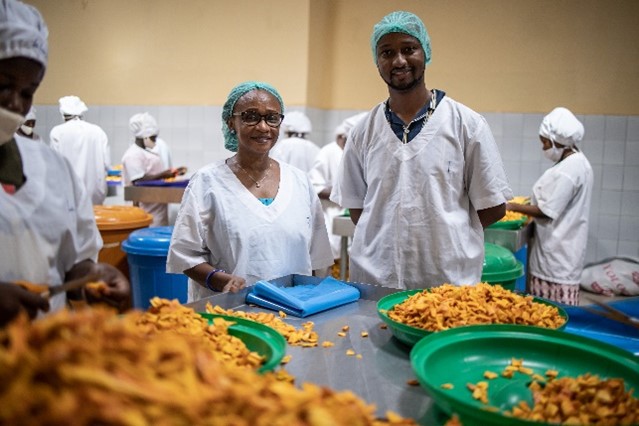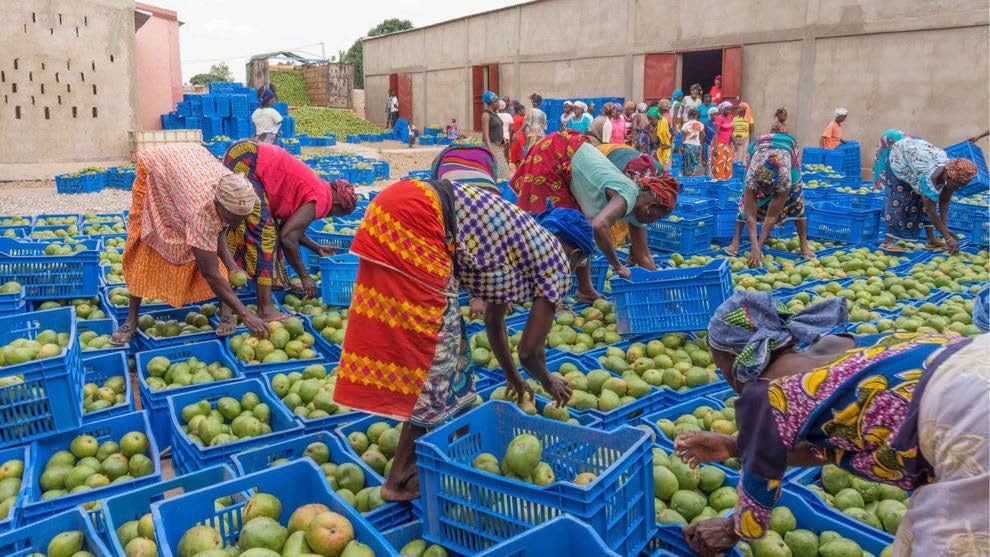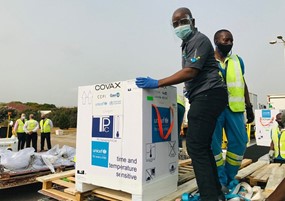Smallholder farmers often struggle to access high-quality inputs, financing to support their planting seasons, post-harvest storage, and transportation to markets. Middle-class farmers working on medium-sized farms face similar challenges. Investment in agriculture is deemed risky and consequently unattractive to financial institutions, and so even with larger farms, producers struggle to access credit facilities that would enable them to access higher quality inputs and fertilizers, employ modern technology in post-harvest storage, or seek technical assistance to improve their farming methods.
With West Africa teetering on the edge of extreme food insecurity, investing in agricultural producers and agribusinesses to keep them competitive and able to meet domestic and regional demand is imperative. The USAID-funded West Africa Trade & Investment Hub (Trade Hub) recognizes the need for more strategic investment to foster agribusiness competitiveness and partnered with private sector businesses across West Africa to fill this gap.
Working with businesses spanning agri-financing, research and development, and cold chain logistics, the Trade Hub has invested in developing a stronger infrastructure to support agricultural productivity and strengthen the economic ecosystem for agri-businesses to thrive.
Supporting Agribusiness SMEs in Burkina Faso
Sinergi Burkina is a private equity firm dedicated to financing and supporting start-ups and SMEs in Burkina Faso. These businesses (mostly semi-industrial or industrial processing units of agricultural products) are often hindered in their development due to difficulty accessing long-term financing. Sinergi Burkina’s approach is centered on the entrepreneur with whom it aims to build a long-term relationship, including financing, technical assistance, and networking.

The USAID West Africa Trade & Investment Hub awarded Sinergi Burkina a co-investment grant of $1 million to be used as cash collateral against loans to SMEs. By leveraging additional investments, the grant will provide eight SMEs across the agricultural, health, energy, and other key sectors in Burkina Faso with $7.6 million (equity and loans) for working capital and capital expenditures, generating an additional $5.4 million in expected revenue. The partnership will create and maintain employment for a minimum of 447 direct jobs and more than 615 indirect jobs, of which 50 percent will be held by young people and 50 percent by women.
To date, Sinergi Burkina has invested in three agri-businesses in Burkina Faso– Rose Eclat (mango value chain), Kokuma (rice value chain), and Bio Prootect (production of organic fertiluzer). Sinergi has additionally trained 1,497 farmers working with Bio Protect on organic production and post-harvest techniques and trained 172 farmers working with Kokuma on Good Agricultural Practices and financial education.
Financing Organic Food Producers in West Africa
Stichting Organic Development Finance (ODF), an initiative of Tradin Organic Agriculture BV, is a non-profit organization that believes that professional organic agriculture is a catalyst for sustainable development in low-income economies. ODF believes this can generate employment, innovation, and economic growth, and foster regenerative and resilient farming systems.

businesses that can achieve sustainable development impacts across Africa.
ODF received a $2 million investable first-loss co-investment grant from the USAID-funded West Africa Trade & Investment Hub (Trade Hub) to provide loans and technical assistance for organic food producers in West Africa. Specifically, the project will help provide six West African supply companies with access to financing through the disbursement of a minimum of $13 million in trade finance loans and a minimum of $4.5 million in capital expenditure investments. Stichting Organic Development Finance will help create and increase sustainable access to premium markets for a minimum of 44,000 smallholder farmers in West Africa through the support and technical assistance provided to these six companies.
To date, ODF has secured an additional $1.2 million in investments and provided export financing to two companies working in the soya and dried mangoes value chains in Togo and Burkina Faso.
Growing the Commercial Cold Chain for Producers & Reducing Post Harvest Loss in Ghana
FreezeLink is Ghana’s leading third-party provider of temperature-controlled transport and warehousing, thus playing a key role in reducing post-harvest loss and waste, supporting food security and diversity, and broadening the availability of medicine on the continent. Founded in 2018, the company provides cold storage facilities such as cold rooms, cold warehouses, and freezers across Ghana and West Africa to help farmers, retailers, and pharmaceutical players preserve the shelf life of their products.

being distributed in Ghana. Photo credit: FreezeLink
The Trade Hub awarded FreezeLink a co-investment grant of $767,158 for its commercial cold chain expansion project. With this grant and the company’s co-investment of $6.4 million from private sources, FreezeLink will grow its fleet of trucks to market more cold unit solutions and services to horticultural exporting companies (HECs) and retailers, resulting in a higher overall volume of high-quality export commodities and fresh produce. Additionally, FreezeLink will install a minimum of 18 fit-for-purpose storage units and purchase 10 service vehicles, with five retrofitted cold chain trucks.
The project is expected to produce an $11.3 million increase in exports among 18 HECs by 2024 and provide a 25 percent reduction in spoilage of vital medical products. Fifty-six direct entry-level and general management jobs will be created, with at least 60 percent of them to be held by women. Freezelink has, to date, submitted proposals to supply their services to 15 horticultural export companies, and won a contract to transport local fish.
These private sector businesses, with Trade Hub support, are building an agri-business ecosystem in West Africa that maximizes productivity and minimizes waste at all points of the agricultural sector.

